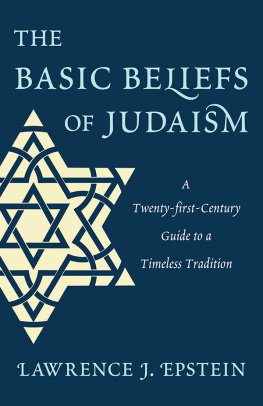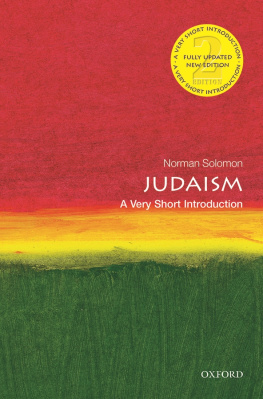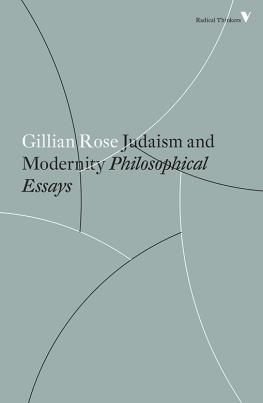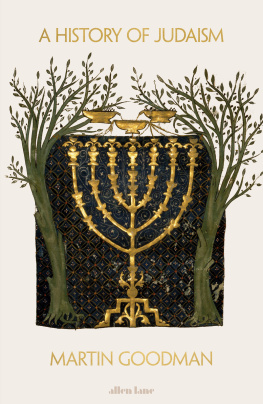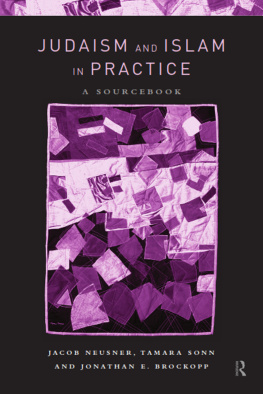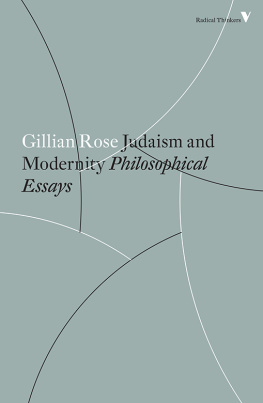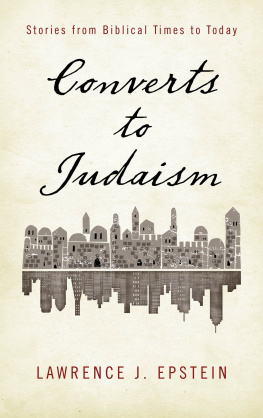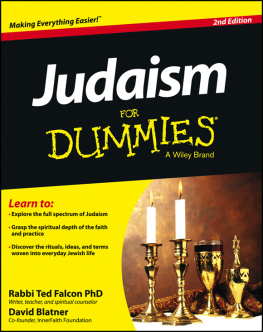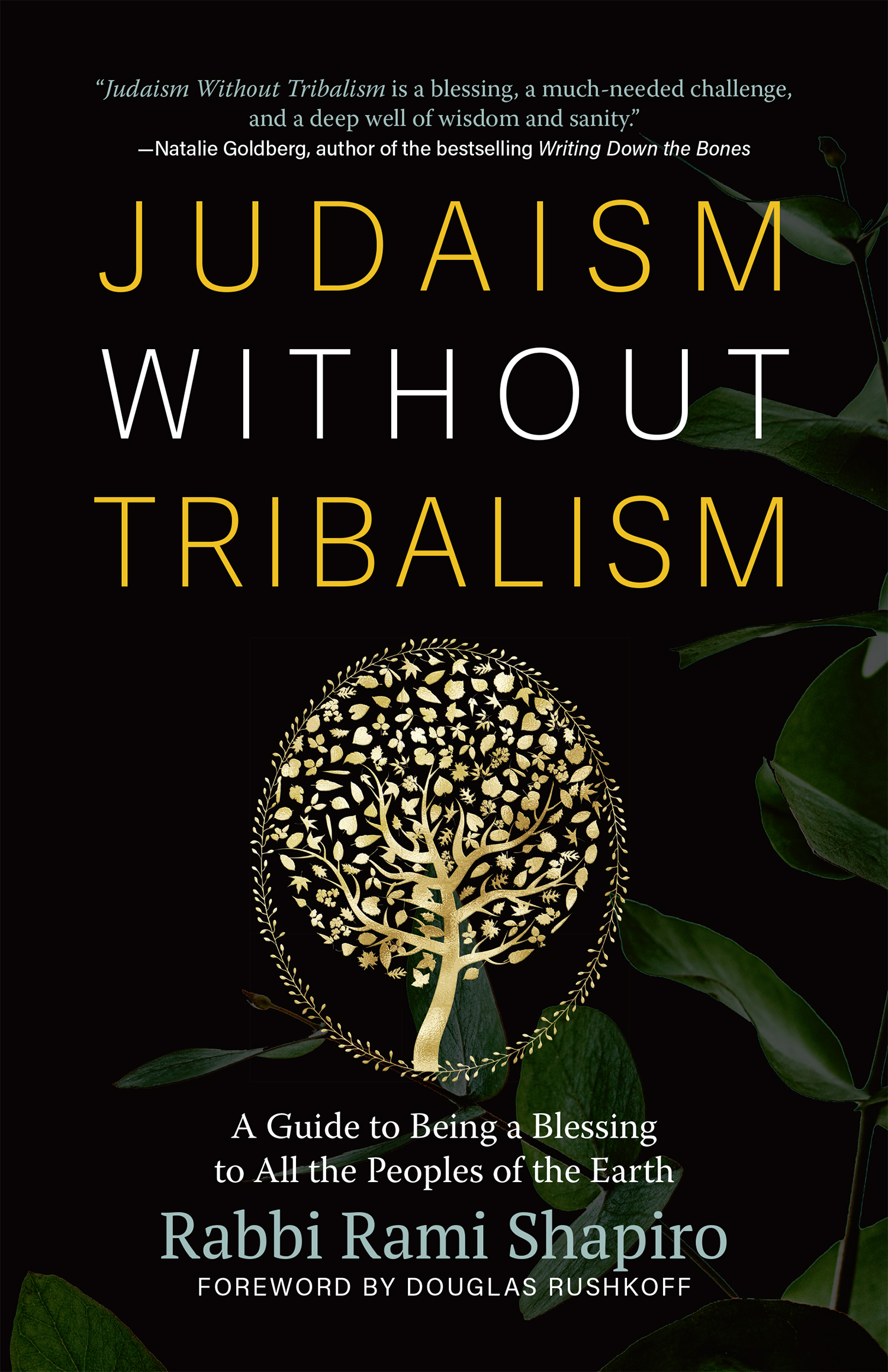Advance Praise for
Judaism Without Tribalism
Shapiros powerful manifesto is a timely and valuable roadmap for an age fraught with ideological division, hatred, and violence. It offers contemplative thought-starters and practical advice for how to invent a better future for all people in the human family.
Spirituality & Health Magazine
Judaism Without Tribalism is a blessing, a much-needed challenge, and a deep well of wisdom and sanity.
Natalie Goldberg, author of the bestselling Writing Down the Bones and Three Simple Lines
An influential religious leader confronts Jewish tribalism in this spiritual guide...Orthodox Jews [may], of course, bristle at the works progressive spirituality, universalization of Judaism, and critiques of tradition. But the book succeeds in its mission to make Judaism accessible to everyone by providing a Jewish lens that could be of use in the spiritual journeys of Jews and non-Jews alike. A compelling, progressive reorientation of an ancient faith.
Kirkus Reviews
Easy to read, yet deep and challenging in its wisdom, this book will become a bible for many who have rejected various Jewish orthodoxies but still know that there is a depth of wisdom in Judaism that they do not want to discard.
Rabbi Michael Lerner, editor of Tikkun Magazine and author of the bestselling The Left Hand of God and Jewish Renewal
In Judaism Without Tribalism , Rabbi Rami brings us the revolutionary essence of the Jewish path, fearlessly smashing the dull idols we have accrued along the way. Rami is an iconoclast extraordinaire, with the moxie to call out religious deceptions that keep us stuck in darkness, and the spiritual clarity to illuminate the jewels of wisdom that can help us change our lives for good. This book is like fresh rain on parched soil.
Rabbi Tirzah Firestone, PhD, author of Wounds Into Wisdom: Healing Intergenerational Jewish Trauma
Rami Shapiro calls on us to question authorities of our time, within Jewish life and in our broader world, identifying the sacred precisely in what others see as strange.
Dan Libenson and Lex Rofeberg, co-hosts of the Judaism Unbound podcast
Judaism Without Tribalism is the best book I ever read. I say that every time Rabbi Rami writes a new bookand its absolutely true. He is a master teacher full of love, wisdom and a reverent irreverence that illuminates both mind and heart.
Dr. Joan Borysenko, author of the bestselling Pocketful of Miracles
Rabbi Rami is a great mystical teacher.
Andrew Harvey, author of The Direct Path
Rabbi Rami fuses intellect, passion, and humor in a beautiful and powerful way that radiates truth.
Wayne Teasdale, author of The Mystic Heart

Judaism Without Tribalism: A Guide to Being a Blessing to All the Peoples of the Earth 2022 by Rabbi Rami Shapiro
All rights reserved. No part of this book may be used or reproduced in any manner without the consent of the publisher except in critical articles or reviews. Contact the publisher for information.
Paperback ISBN 978-1-948626-65-1
eBook ISBN 978-1-948626-66-8
Library of Congress Cataloging-in-Publication Data
Names: Shapiro, Rami M., author.
Title: Judaism without tribalism : a guide to being a blessing to all the
peoples of the earth / Rabbi Rami Shapiro ; introduction by Douglas
Rushkoff.
Description: Rhinebeck, New York : Monkfish Book Publishing Company, [2022]
Identifiers: LCCN 2021061077 (print) | LCCN 2021061078 (ebook) | ISBN
9781948626651 (paperback) | ISBN 9781948626668 (ebook)
Subjects: LCSH: Judaism. | Jewish way of life.
Classification: LCC BM45 .S4618 2022 (print) | LCC BM45 (ebook) | DDC
296--dc23/eng/20211223
LC record available at https://lccn.loc.gov/2021061077
LC ebook record available at https://lccn.loc.gov/2021061078
Book and cover design by Colin Rolfe
Minimal Eucalyptis Leaves photo by Annie Spratt on Unsplash
Monkfish Book Publishing Company
22 East Market Street, Suite 304
Rhinebeck, NY 12572
(845) 876-4861
monkfishpublishing.com
Contents
Chapter 1
Chapter 2
Chapter 3
Chapter 4
Chapter 5
Chapter 6
Chapter 7
Chapter 8
Chapter 9
Chapter 10
Chapter 11
Chapter 12
Chapter 13
Chapter 14
Appendix I
Appendix II
Appendix III
Appendix IV
Douglas Rushkoff
Foreword
For many people, I suspect, Judaism without tribalism wont sound like Judaism at all. Thats because Judaismat least as my friend Rami Shapiro and I understand itmay best be thought of less as a religion than the way we get over religion.
Think about it. Our Torah doesnt tell the story of the founding of a religion. Its about our escape from an empire of slaves controlled by death cults. We are rescued from Egypt, or mitzrayim not just the narrow place imprisoning Israelite bodies, but a narrow mindset imprisoning Israelite hearts and souls.
And how do we get out of there? The plagues, each of which represents the desecration of another Egyptian god. Blood desecrates the Nile, a god. Locusts desecrate the corn god, and so on, until we get to the ultimate desecration. In April, the Egyptian New Year, when everyone is supposed to be worshipping a ram, what do the Israelites do? Kill a lamb as a sacrificean abomination in Egyptand then put the blood on the door, as if to publicize the fact.
Out to the desert we run. For forty years we walk around out there, not to create a new religion but to wean ourselves off the need for idols, and beliefs, and any religiosity at all. The whole generation of believers has to die off. Sure, we build an Ark of the Covenant, and its pretty much like the Egyptian arks we built before as slaves. But theres one key difference: theres no god up on the top. Rather, theres an empty space guarded by two fierce cherubs. We get no thing to worship, and those cherubs are going to make certain of it.
Sure, occasionally we go crazy and try to shove something into that empty space. Moses cant turn his back for a minute before were crafting a golden calf of one kind or another. And even today, we try to deify silly things like money and power, or even important things like education or Israel. But none of them are gods.
No, our deity is so unknowable, unseeable, unnamable that it may as well not be there at all. That may be the whole point. Judaism invites us to take our gaze off the idealized icon in the skyhowever temporarily reassuringand place it on one another.
Yes, we are the real prize, here. We people. Our families, communities, friends, neighborsand even those people over there who we dont quite understand and certainly dont agree with.
Living in a tradition like this, as Tevye reminded us, isnt easy. It requires constant improvisation and adaptation to new circumstances, grounded only in the wisdom of the generations that preceded us. Our Talmudic laws may be helpful guideposts, but our morality comes in the moment, spontaneously emerging from our conscience. And this conscience, this moral sensibility, is what we learn from our stories, our community, our experiences, our holidays, and our parents.
Judaism without tribalism requires us to abandon the idols and icons, brands and beliefs on which we might prefer to rely as we navigate a course through the strange, modern world. But these symbols are not up to the challenge. Theyre dead, static trapsartifacts of fear and desireand not at all relevant to lived experience of Jewishness.


